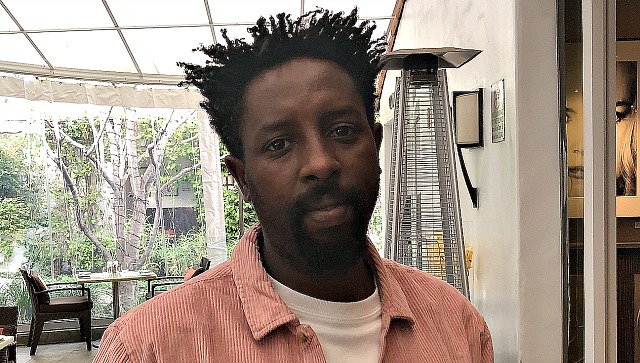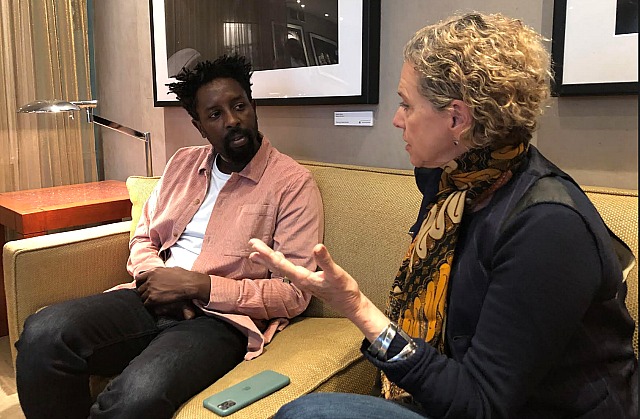Ladj Ly‘s Les Miserables (Amazon, 1.10.20) is the official French nominee for the 2020 Best International Feature Oscar, having nudged aside Celine Sciamma‘s much-admired Portrait of a Lady on Fire. It was my favorite film at last May’s Cannes Film Festival, and the film I’d most like to see win the foreign Oscar on 2.9.20.
I know Parasite has it in the bag but Ladj Ly‘s film is just as socially incisive as Bong Joon-ho‘s, and it has no insane story-logic issues. And a much better ending. It would be a major miscarriage of artistic justice if Les Miserables doesn’t at least emerge as one of the Best International Feature Oscar nominees.
The other day I stopped by West Hollywood’s Sunset Marquis for a brief sit-down with Ladj Ly. Or rather with the non-English-speaking Ladj and his interpreter. Two on the couch, one (me) on a nearby chair.

Ladj struck me as a sea of calm. Settled, unhurried, matter of fact, good eye contact. Reluctant to smile too quickly or easily, but when he smiles it counts. His English sucks as badly as my French, which naturally put me at ease.
So we had a nice, easygoing chat but I never got a quote as good as the one Ladj gave the N.Y. Times the other day, so here it is: “I was inspired by my own history. Everything in the film comes from my life, from beginning to end. It’s a sort of autobiography, and a witnessing. I tried to make a film that resembles [the community that I live in]. To live in these towers — it’s violent, it’s degrading.”
Set in the Parisian suburb of Montfermeil, a poor but tightly-knit African Muslim community (where Ladj grew up and still lives), it offers a jolting contemporary echo of the cruelty, harassment and oppression that ignited Victor Hugo’s classic 1862 novel, this time rooted in police brutality and racial animus.
Written by Giordano Gederlini and Alexis Manenti and brilliantly shot by Julien Poupard, Les Miserables feels like a rough-and-tumble Antoine Fuqua film, using the basic dynamic of Training Day (but with three cops instead of two) plus a Little Do The Right Thing plus a constant stream of anxious urban energy. And with an open-ended existential ending that resembles the finale of Danis Tanovic‘s No Man’s Land. Or, if you will, the last two or three minutes of Asghar Farhadi‘s A Separation.

Part policier and part social-canvas suspenser, Les Miserables is basically about conflicted cops (including one bad apple) under pressure vs. a crew of scrappy, rambunctious, vaguely criminal kids in the ‘hood.
It takes the side of Montfermeil natives but also portrays the cops in reasonably fair and humanistic terms.
“The story is about a mischievous Muslim kid named Issa (Issa Perica) who gets himself into hot water by stealing a lion cub from a small local circus. The circus guys angrily threaten some Montfermeil community leaders (not the suit-wearing kind), and soon after the film’s three plainclothes protagonists — the racist and brutish Chris (Alexis Manenti), a casually brusque but decent-hearted Montfermeil native named Gwada (Djibril Zonga) and Stephane (Damien Bonnard), a new transfer with a curtly liberal, mildly compassionate approach to police work — are on the hunt.
“They eventually chase down and capture Issa, but then comes the triggering incident: an agitated Gwada fires a flashbang (a non-lethal stun grenade) into the kid’s face. Luckily Issa recovers, but Chris and Gwada go into panic mode when they realize that the incident has been captured by a drone-mounted video camera. Despite Stephane’s objections, the priority becomes finding and destroying the visual evidence.
“Closing motto: ‘There are no such things as bad plants or bad men. There are only bad cultivators.’
